Related Research Articles
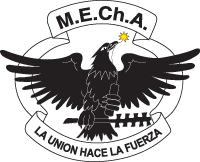
M.E.Ch.A. is a US-based organization that seeks to promote Chicano unity and empowerment through political action. The acronym of the organization's name is the Chicano word mecha, which is the Chicano pronunciation of the English word match and therefore symbolic of a fire or spark; mecha in Spanish means fuse or wick. The motto of MEChA is 'La Union Hace La Fuerza'.

Lucille Elsa Roybal-Allard is an American politician who served as a U.S. representative from California from 1993 to 2023. A member of the Democratic Party, she first entered Congress in 1993. Her district, numbered as the 33rd until 2003, the 34th from 2003 to 2013, and the 40th from 2013 to 2023, included much of southern Los Angeles, as well as several eastern suburbs, such as Downey, Bell and Bell Gardens. On December 20, 2021, Roybal-Allard announced her retirement at the end of the 117th Congress.
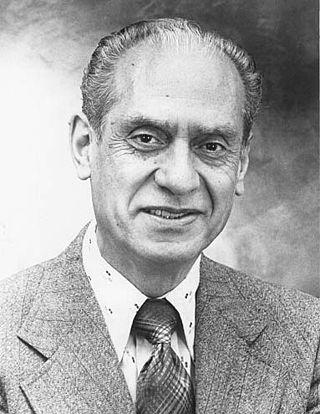
Edward Ross Roybal was a Mexican-American politician. A Democrat, he was a member of the Los Angeles City Council from 1949 to 1962 and of the U.S. House of Representatives from 1963 to 1993.

The Congressional Hispanic Caucus (CHC) is an organization of 38 Democratic members of the United States Congress of Hispanic and Latino descent. The Caucus focuses on issues affecting Hispanics and Latinos in the United States. The CHC was founded in December 1976 as a legislative service organization of the United States House of Representatives. The CHC is organized as a Congressional Member organization, governed under the Rules of the U.S. House of Representatives.

The National Association of Latino Elected and Appointed Officials (NALEO) is the 501(c)(4) nonpartisan leadership organization of the nation's more than 6,700 Latino elected and appointed Latino public officials in the United States. NALEO Educational Fund, founded in 1981, is the 501(c)(3) arm of the organization, with a mission of facilitating full Latino participation in the American political process, from citizenship to public service.
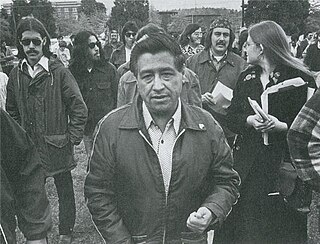
The Chicano Movement, also referred to as El Movimiento, was a social and political movement in the United States that worked to embrace a Chicano/a identity and worldview that combated structural racism, encouraged cultural revitalization, and achieved community empowerment by rejecting assimilation. Chicanos also expressed solidarity and defined their culture through the development of Chicano art during El Movimiento, and stood firm in preserving their religion.
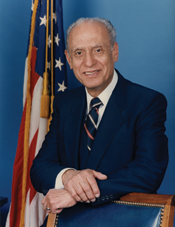
The Mexican American Political Association (MAPA) is an organization based in California that promotes the interests of Mexican-Americans, Mexicans, Latinos, Chicanos, Hispanics, and Latino economic refugees in the United States. Founded in 1960, their goal was to further incorporate Mexican-Americans into American politics and society through increased voter turnout and election to public office. MAPA, alongside the rest of the member organizations of the Political Association of Spanish-Speaking Organizations (PASSO), developed from the Viva Kennedy Campaign to elect John F. Kennedy president.

Partido Nacional de La Raza Unida was a Hispanic political party centered on Chicano (Mexican-American) nationalism. It was created in 1970 and became prominent throughout Texas and Southern California. It was started to combat growing inequality and dissatisfaction with the Democratic Party that was typically supported by Mexican-American voters. After its establishment in Texas, the party launched electoral campaigns in Colorado, Arizona, New Mexico, and California, though it only secured official party status for statewide races in Texas. It did poorly in the 1978 Texas elections and dissolved when leaders and members dropped out.
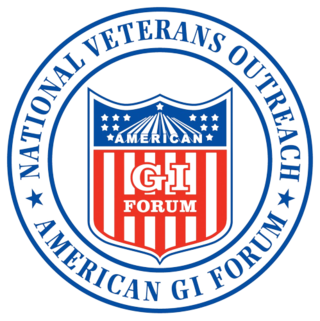
The American GI Forum (AGIF) is a congressionally chartered Hispanic veterans and civil rights organization founded in 1948. Its motto is "Education is Our Freedom and Freedom should be Everybody's Business". AGIF operates chapters throughout the United States, with a focus on veterans' issues, education, and civil rights. Its two largest national programs are the San Antonio-based Veterans Outreach Program, and the Dallas-based Service, Employment, Redevelopment-Jobs for Progress, Inc. (SER). The current National Commander is David Rodriguez.

The Congressional Hispanic Conference (CHC) is a Republican sponsored caucus in the United States Congress. Currently with eleven members, the CHC was formed in 2003, with the stated goal of promoting policy outcomes of importance to Americans of Hispanic or Lusitanic descent. These priorities included support of the following: President George W. Bush and American troops in the war against terrorism; the Free Trade Agreement of the Americas (FTAA); tax relief to families and the over two million Hispanic- and Lusitanic-owned small businesses; support for faith based initiatives; and, educational choice for all. The impetus behind the Conference's creation was the debate surrounding the nomination of conservative lawyer Miguel Estrada to the DC Circuit Court of Appeals and ideological differences in the Congressional Hispanic Caucus, which was predominantly populated by Democratic members of Congress.

Pete Peña Gallego is an American lawyer, politician, and higher education leader who served as the U.S. representative for Texas's 23rd congressional district from 2013 to 2015. A member of the Democratic Party, he previously served as a member of the Texas House of Representatives from the 68th district beginning in 1991. He was president of his alma mater, Sul Ross State University in Far West Texas, from 2020 through 2022 and continues to serve as president emeritus as he writes and speaks on issues related to college accessibility and affordability, particularly for first-generation students.
The Mexican American Legislative Caucus is a 501(c)(6) non-profit organization composed of members of the Texas House of Representatives committed to addressing issues of particular importance to Latinos across the state.

The League of United Latin American Citizens (LULAC) is the largest and oldest Hispanic and Latin-American civil rights organization in the United States. It was established on February 17, 1929, in Corpus Christi, Texas, largely by Hispanics returning from World War I who sought to end ethnic discrimination against Latinos in the United States. The goal of LULAC is to advance the economic condition, educational attainment, political influence, housing, health, and civil rights of Hispanic people in the United States. LULAC uses nationwide councils and group community organizations to achieve all these goals. LULAC has about 132,000 members in the United States.
Mary Edna González is an American politician who serves in the Texas House of Representatives from House District 75. She is a member of the Democratic Party and was elected in November of 2012 to represent an area that includes eastern El Paso County, parts of the city of El Paso and the towns of Socorro, Clint, Fabens, Horizon City, San Elizario and Tornillo. She is also the first openly pansexual elected official in the United States.

The National Hispanic Leadership Agenda (NHLA) is a non-profit leadership association. Established in 1991, the group consists of Hispanic leaders and national organizations throughout the United States. It is a nonpartisan organization that works to identify and analyze public policy issues affecting the Latino community.
The Political Association of Spanish-Speaking Organizations (PASSO) was formed as an outgrowth of the success of the Viva Kennedy Clubs in the 1960 United States Presidential Election. PASSO, which comprised several Mexican-American activist groups, fought to increase Mexican-American participation in electoral politics and campaigned for candidates, generally of Mexican descent, who supported desegregated education, protection from discrimination and federal government jobs for Mexican Americans. Later, the group became involved in farm labor disputes and was ultimately disbanded.
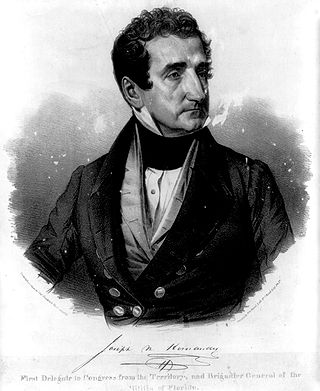
Hispanic and Latino Americans have served in the United States Congress since the early 19th century. The first group elected to serve in the Congress were incorporated as part of the United States territorial expansion into previous Spanish territories of the North American mainland as part of American campaigns of Manifest destiny. The earliest Hispanic and Latino Representation in Congress came in the form of territorial delegates from newly acquired territories, such as Florida, New Mexico, and more, serving as representatives for territories that later on join the United States with full statehood. The history of Latino and Hispanic Americans in Congress is intertwined with the history of United States expansion on the North American mainland, with expansion into previous Spanish and Mexican lands leading to expansions in Hispanic and Latino influence in Congress.
The Congressional Hispanic Caucus Institute (CHCI) is a Hispanic nonprofit and nonpartisan 501(c)(3) leadership development organization established in 1978 by organizing members of the Congressional Hispanic Caucus (CHC) and is headquartered in Washington, D.C.

A Mexican American is a resident of the United States who is of Mexican descent. Mexican American-related topics include the following:
Joseph "Joe" Bernal is an American politician. He was a significant figure in the Chicano community. Bernal spent eight years in the Texas Legislature. Bernal was in both the Texas House of Representatives and the Texas Senate. Bernal was in the Texas House of Representatives from 1964 to 1966, He was in the Texas Senate from 1966 to 1972. When Bernal got his start in politics 80% of Chicanos were not graduating high school. Now only 30% are not graduating which he says is still a high percentage. During his time in politics, Bernal produced many opportunities for schooling and opportunities for the Chicano community as a whole. The impact that Bernal had on his community got San Antonio school district superintendent Oscar Miller to meet with community sponsors such as Senator Bernal and others to address Chicano/a student's demands for improved school facilities.
References
- ↑ "The Batten School Partners with the Congressional Hispanic Caucus Institute to Provide Fellowships to Latinx Leaders | Frank Batten School of Leadership and Public Policy | University of Virginia". batten.virginia.edu. Archived from the original on 2020-10-09. Retrieved 2020-10-09.
- ↑ "About Us | Congressional Hispanic Caucus Institute". 2017-11-27. Archived from the original on 2020-09-20. Retrieved 2020-10-09.
- ↑ "LULAC History and Geography 1929-1988 - Mapping American Social Movements". depts.washington.edu. Archived from the original on 2020-10-06. Retrieved 2020-10-09.
- ↑ "About Us". LULAC. Archived from the original on 2020-09-30. Retrieved 2020-10-09.
- ↑ "UnidosUS (formerly National Council of La Raza)". www.influencewatch.org. Retrieved 2020-10-07.
- ↑ "Why MEChA Burned Out After 50 Years". Latino/a Studies. Retrieved 2020-10-07.
- ↑ "Comisión Femenil Mexicana Nacional, Inc". UCSB Library. 2011-08-19. Retrieved 2020-10-07.